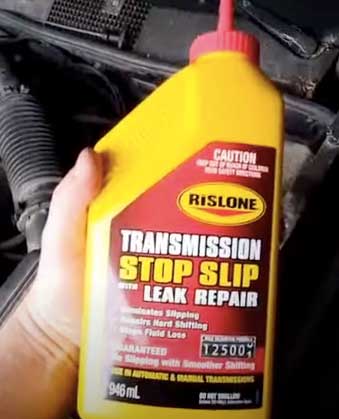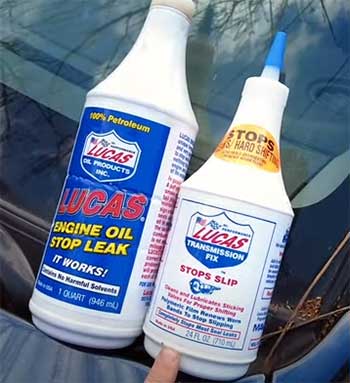Transmissions are vital components in the automotive world. They transfer power from your car’s engine to the wheels, ensuring a smooth ride. However, these parts can start to fail, leaking and causing issues that can bring your vehicle to a grinding halt.
This is where transmission stop slip additives come into play, with two big names on the market: Rislone and Lucas. In this article, we’ll delve into a detailed comparison of Rislone and Lucas transmission stop slip, providing you with the pros and cons to help you make an informed decision.
A Brief Comparison Table
| Feature | Rislone Transmission Stop Slip | Lucas Transmission Stop Slip |
|---|---|---|
| Compatibility | Universal | Limited |
| Effectiveness | High | High |
| Volume for Price | Standard | More for the same price |
| Solution Type | Temporary | Temporary |
| User Feedback | Generally Positive | Generally Positive |
The Basics: Rislone Transmission Stop Slip

Rislone’s Transmission Stop Slip with Leak Repair is a high-quality additive.
It targets aged seals and gaskets, aiming to stop leaks, reduce rough shifting, and eliminate slip.
It is compatible with all automatic, manual, CVT, and dual-clutch transmissions.
Pros of Rislone Transmission Stop Slip
- Rislone’s Effectiveness: Many users report a marked improvement in their transmission’s functionality after using Rislone. It often stops leaks and eases hard shifting.
- Universal Compatibility: Rislone can work with any type of transmission, making it a go-to choice for a variety of vehicles.
Cons of Rislone Transmission Stop Slip
- Temporary Solution: Like any additive, Rislone is more of a band-aid than a permanent fix. It can help prolong your transmission’s lifespan but won’t replace the need for eventual repair or replacement.
Diving into Lucas Transmission Stop Slip
Lucas Transmission Fix is a non-solvent formula that is designed to stop slip, hesitation, and rough shifting in worn transmissions. It can also eliminate most seal leaks and is compatible with most transmission fluids.
Pros of Lucas Transmission Stop Slip
- Lucas’s Effectiveness: Lucas Transmission Fix is known for its effectiveness in reducing transmission issues, with many users reporting successful outcomes in addressing slipping, rough shifts, and leaks.
- Value for Money: Lucas tends to offer larger volumes at comparable prices to other brands, making it a good option if you’re on a budget.
Cons of Lucas Transmission Stop Slip
- Limited Compatibility: While Lucas is compatible with many transmissions, it’s not as universally applicable as Rislone. Some users have reported issues with certain types of transmissions.
- Temporary Fix: Much like Rislone, Lucas’s additive serves as a temporary solution. It can buy you time, but won’t negate the need for a repair or replacement down the line.
Key Differences Between Rislone & Lucas Transmission Stop Slip
While Rislone and Lucas Transmission Stop Slip share many similarities, they do have several key differences. Let’s delve deeper into these contrasting features:
- Compatibility

Rislone: One of the standout features of Rislone Transmission Stop Slip is its universal compatibility.
It works effectively with all types of transmissions – be it automatic, manual, CVT, or dual-clutch.
This broad compatibility makes it a versatile option for almost any vehicle.
Lucas: On the other hand, Lucas Transmission Fix is not as universally compatible.
While it works with many transmissions, it does not cater to all types. Some users have reported issues when using Lucas with certain types of transmissions.
- Volume and Price
Rislone: Rislone’s product comes in a standard-sized bottle and is competitively priced, aligning with industry standards.
However, compared to Lucas, you might find less product for a similar price point.
Lucas: Lucas Transmission Fix often comes in larger bottles compared to other brands. This means you’re getting more product for your money, which can be beneficial if you’re looking for value in terms of quantity.
- User Feedback
Rislone: Many users reported marked improvements after using Rislone’s product. They’ve seen success in stopping leaks and reducing hard shifting.
However, as with any additive, it’s a temporary solution and not a replacement for professional repair or replacement.
Lucas: Lucas has a strong reputation for reducing transmission issues. Users have reported successful results when dealing with leaks, slips, and rough shifts. Like Rislone, it is a temporary fix and is not designed to replace the need for repair or replacement of worn or damaged parts.
While both Rislone and Lucas provide reliable, temporary relief for transmission issues, your choice might depend on the specific requirements of your vehicle, your budget, and the extent of your transmission problems.
Always remember, though, that a severely damaged transmission will likely require professional attention beyond the scope of these additives.
Both Rislone and Lucas transmission stop slip additives provide temporary relief for common transmission issues like leaks, slipping, and rough shifts. Rislone seems to have a slight edge in terms of universal compatibility, while Lucas offers better value for money.
However, neither is a permanent fix for a failing transmission.
Also Read: Comparison of Mobil 1 Synthetic LV ATF HP and DEXRON VI Transmission Fluid.
Frequently Asked Questions (FAQ)
The “best” additive depends on your specific needs. Both Rislone and Lucas have proven effective for many users. Rislone tends to be more universally compatible, while Lucas offers a larger volume for the price.
Generally, Lucas Transmission Fix is not bad for your transmission. It can help reduce slipping and rough shifting. However, it’s important to remember that it is a temporary solution, and significant or persistent transmission issues may require professional repair or replacement.
Rislone and Lucas both offer high-quality sealants as part of their transmission stop slip additives. Their effectiveness can vary based on the extent of the damage and the type of transmission.
Lucas Transmission Fix is generally considered beneficial. It can help to reduce common issues like leaks, slipping, and rough shifts. However, it’s essential to keep in mind that additives are temporary solutions and cannot replace professional repairs if your transmission is significantly worn or damaged.
Wrapping Up
In conclusion, both Rislone and Lucas provide valuable temporary relief from common transmission issues. While they won’t replace the need for professional repairs, they can help keep your car on the road a little longer.
As always, it’s essential to consult with a professional if you have significant concerns about your vehicle’s transmission.

